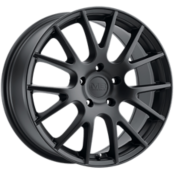HOW DOES WHEEL WEIGHT IMPACT VEHICLE PERFORMANCE?
You might have come across the term "forged wheels" while shopping for a new set of rims. Forged wheels are manufactured in a more involved process than cast wheels, which means they are more expensive. However, they are much stronger and can use less material than cast wheels, leading them to be lighter. Forged wheels can be 10-20lbs lighter than a cast aluminum wheel.
Wheel weight absolutely impacts vehicle performance. Below are some important key terms you should keep in mind when searching for lightweight wheels.
Sprung weight – the weight not supported by the suspension. Examples include rear seats, insulation, interior panels and even the spare tire. Many enthusiasts opt to remove these to decrease weight for performance or economic effects.
Unsprung weight/rotational mass – the weight supported by your vehicle’s operational components, including tires, wheels, driveshaft and brakes..
Handling – a vehicle’s responsiveness to steering input and its road-holding ability.
Rotary Forged/Flow Formed – performance wheel manufacturing techniques that reduce wheel weight and strengthen the wheel structure itself.
Unsprung weight (ie the rotational mass) is reduced when you replace your stock OE wheels for lighter aftermarket or performance-based wheels.
According to the laws of inertia, the unsprung weight of a wheel requires roughly three times the power to accelerate over stationary dead weight.
For example, if you can drop 15 pounds per wheel, you have effectively removed around 180 pounds of unsprung weight. This is a huge weight off of your drivetrain and chassis that will make your vehicle feel more responsive and accelerate more quickly.
In high-powered muscle cars like a Mustang or a Camaro, losing unnecessary unsprung weight makes a huge difference, in the tenths of a second range—the equivalent to one or two car lengths at a track.
For hybrids or other hyper-efficient vehicles, losing excess weight and putting less stress on engines yields an increase in miles per gallon in both city and highway applications.
If you combine lightweight wheels with energy-efficient tires that have low rolling resistance properties (LRR), you can see a significant uptick in fuel economy. This is especially pertinent to the hypermiling community who are then able to cruise at lower highway speeds and accelerate as smoothly as possible.
TYPES OF LIGHTWEIGHT WHEELS
ROTARY FORGED
Rotary forged wheels are forged at high pressure while the wheel spins at high speed, augmenting the alloy's strength and reducing the weight compared to a cast wheel. TSW and Black Rhino are examples of brands with rotary forged offerings.
FLOW FORMED
Flow formed wheels are manufactured by applying pressure to the inner barrel of the wheel during spinning, and after casting. In this process, aluminum is stretched and compressed, creating a stronger and lighter wheel with greater shock resistance. Enkei and Konig are brands offering flow formed wheels.
Alloy wheels are also popular lightweight aftermarket wheel options, as they are generally going to be lighter than equivalent-size steel wheels.
Lightweight rims and wheels are great options for extreme driving and motorsports but are also great options for commuter and passenger vehicles. Light rims give you another opportunity to personalize and ramp up your ride's aesthetic.
You can use our wheel visualizer to help you pick out the wheels that suit your vehicle best. And if you're having trouble deciding on your next set of tires, then let Treadwell, our intuitive tire buyer's guide, help you. Treadwell uses driver's data such as as vehicle make, model, driver habits and climate to help you choose the right tire for you.
If you have any questions about lightweight wheels, give us a ring or stop by your local store and we’ll get you taken care of.
Get a shorter wait time in-store when you buy and book online!

